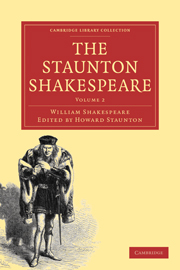Book contents
- Frontmatter
- Contents
- ALL'S WELL THAT ENDS WELL
- KING HENRY THE FIFTH
- AS YOU LIKE IT
- PERICLES, PRINCE OF TYRE
- TWELFTH NIGHT; OR, WHAT YOU WILL
- THE FIRST PART OF KING HENRY THE SIXTH
- THE SECOND PART OF KING HENRY THE SIXTH
- THE THIRD PART OF KING HENRY THE SIXTH
- TIMON OF ATHENS
- KING RICHARD THE THIRD
- MEASURE FOR MEASURE
- KING HENRY THE EIGHTH
- CYMBELINE
ALL'S WELL THAT ENDS WELL
Published online by Cambridge University Press: 29 August 2010
- Frontmatter
- Contents
- ALL'S WELL THAT ENDS WELL
- KING HENRY THE FIFTH
- AS YOU LIKE IT
- PERICLES, PRINCE OF TYRE
- TWELFTH NIGHT; OR, WHAT YOU WILL
- THE FIRST PART OF KING HENRY THE SIXTH
- THE SECOND PART OF KING HENRY THE SIXTH
- THE THIRD PART OF KING HENRY THE SIXTH
- TIMON OF ATHENS
- KING RICHARD THE THIRD
- MEASURE FOR MEASURE
- KING HENRY THE EIGHTH
- CYMBELINE
Summary
The earliest version of this comedy we possess is that of the folio, 1623. If a prior edition were ever printed, a copy of it would be inestimably valuable; for of all the plays of Shakespeare this appears to have suffered most from the negligence of transcribers and compositors. Malone, in his latest chronological arrangement, upon a supposed allusion to the fanaticism of the Puritans, dates its production in 1606; but there need be little hesitation in believing that it was one of the author's youthful productions, and most probably the piece indicated by Mores, in his “Palladis Tamia,” 1598, as “Love Labors Wonne:” that it was intended as a counter-play to “Love's Labour's Lost,” and was originally intituled “Love's Labour's Won; or, All's Well that Ends Well.”
The fable is derived from the story of “Giletta of Narbona,” forming the ninth novel of the third day in Boccaccio's “Decamerone,” a translation of which is given in the first volume of Painter's “Palace of Pleasure,” quarto, 1566; where the argument is thus set forth :— “Giletta, a phisician's daughter of Narbon, healed the Frenche Kyng of a fistula, for reward wherof she demaunded Beltramo counte of Rossigniole to husband. The counte beyng maried againste his will, for despite fled to Florence and loved an other. Giletta his wife, by pollicie founde meanes to lye with her husbande in place of his lover, and was begotten with child of two soonnes; whiche knowen to her husbande, he received her againe and afterwards she lived in greate honor and felicitie.”
- Type
- Chapter
- Information
- The Staunton Shakespeare , pp. 1 - 58Publisher: Cambridge University PressPrint publication year: 2009First published in: 1859
- 1
- Cited by

